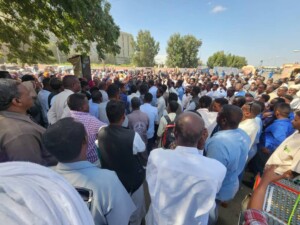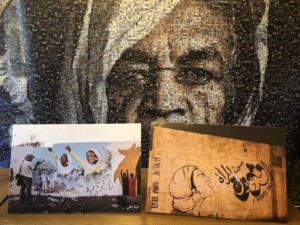Protest against violence by militant herders in North Darfur
On Wednesday, members of the Resistance Committee in the Dar Biri area in Kutum locality, North Darfur, organized a protest in front of the Government Secretariat in El Fasher against attacks by armed militias and herders on farmers in the areas of Gouz Yumin, Amri, Baashim, and Basou, three days ago.
 Abbala Rizeigat in North Darfur (Albert González Farran / UNAMID)
Abbala Rizeigat in North Darfur (Albert González Farran / UNAMID)
On Wednesday, members of the Resistance Committee in the Dar Biri area in Kutum locality, North Darfur, organised a protest in front of the Government Secretariat in El Fasher against attacks by militant herders on farmers in the areas of Gouz Yumin, Amri, Baashim, and Basou, three days ago.
The committee handed over a memorandum demanding an end to the attacks. They also demanded disarmament of militias, police protection, and special protection during the agricultural season.
Ismail Zakaria, representative of the committee, confirmed the continuation of killings, lootings, the destruction of farms by herding groups, and the occupation of land by new settlers. He also disclosed that many gunmen are wearing military uniforms.
Armed herders have been involved in more attacks. On Monday, herders attacked a group of displaced people in the Gallab area southwest of El Fasher.
Tribal clashes
In addition to the violence against farmers, the clashes between the Rizeigat and Fallata tribes continued yesterday in the El Tawil area, east of Gireida town, South Darfur. This is the third consecutive day clashes have taken place in the area.
At least 10 people have been killed in the clashes. The wali (governor) of South Darfur, Mousa Mahdi, called for immediate trials against “criminals and outlaws who seek to destabilize the state’s security and stability”.
The Rizeigat are nomadic Arab herders. In South Darfur they mainly herd cattle. During the war in Darfur at the beginning of this century Rizeigat herders joined the Janjaweed militia, that was responsible for ethnic cleansing. The Fallata are cattle herders as well, but from African ethnic origin.
These are not the only incidences of tribal clashes the area. On Saturday, 15 people were killed in fighting between Masalit farmers and Fallata herders in South Darfur.
UNAMID exit
There have been various protests against the planned exit of the joint United Nations-African Union Mission in Darfur (UNAMID) on December 31. The governor of Central Darfur, Adib Abdelrahman, warned for an increase in violence and crime if the withdrawal of the mission goes ahead as scheduled.
Amnesty International has urged the UN Security Council to extend its mandate for the mission by at least six months “in light of failure by government security forces to protect civilians in recent months”.
Protesters also fear that the departure of the mission would create a security vacuum and encourage various armed groups to commit more crimes and violate human rights.
Radio Dabanga’s editorial independence means that we can continue to provide factual updates about political developments to Sudanese and international actors, educate people about how to avoid outbreaks of infectious diseases, and provide a window to the world for those in all corners of Sudan. Support Radio Dabanga for as little as €2.50, the equivalent of a cup of coffee.










 and then
and then